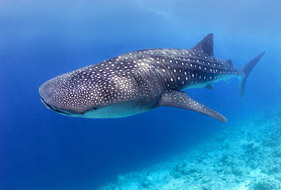Have a whale of a time

Sustainable whale watching as mandatory training kicks in
The thousands of tourists who flock to Mexico’s Yucatan peninsula each summer to catch a sight of the world’s biggest fish, the whale shark, can now do so safe in the knowledge their encounter will be more sustainable.
The Mexican government passed legislation in November to bring in mandatory training for guides wishing to renew their licenses to offer whale shark excursions.
A new training tool, developed in partnership between UK sustainable tourism charity, the Travel Foundation, the Maldives Whale Shark Research Project and Eco Colors Tours, covers diverse subjects to improve the sustainability of whale shark excursions, including biology and ecology, conservation, good guiding practice and customer communications.
As a result of the legislation, the tool is now being used in conjunction with practical training provided by SECTUR (the local government) and those wishing to complete the course will also be required to sit an exam to receive certification.
Sue Hurdle, chief executive of the Travel Foundation, said: "Whale shark viewing is increasingly popular with tourists. Waters around the north of the Yucatan peninsula attract one of the biggest populations of whale sharks each summer, who come to feed on the plankton. Although legislation and guidelines on responsible whale shark viewing exists, limited training had been provided to guides themselves until now.
"As a result of this partnership, guides wishing to offer such trips can do so safe in the knowledge they are not having a negative impact on the animals, and tourists can visit the whale sharks in their natural habitat knowing guides have been properly trained."
The training tool was developed following a pilot project in 2008, when the Travel Foundation and its partners delivered training to 60 people in the region offering, or wishing to offer, whale shark viewing excursions. Participants included guides wanting to deliver a better quality and more sustainable experience to customers and local fisherman seeking an opportunity to earn an alternative income in a region where employment opportunities are few and over-fishing is prevalent.
Valere Tjolle
Valere is editor of the Sustainable Tourism Report Suite 2012 Special Offers HERE
 United Kingdom
United Kingdom United States
United States Asia Pacific
Asia Pacific












































Dozens fall ill in P&O Cruises ship outbreak
Turkish Airlines flight in emergency landing after pilot dies
Boy falls to death on cruise ship
Unexpected wave rocks cruise ship
Woman dies after going overboard in English Channel